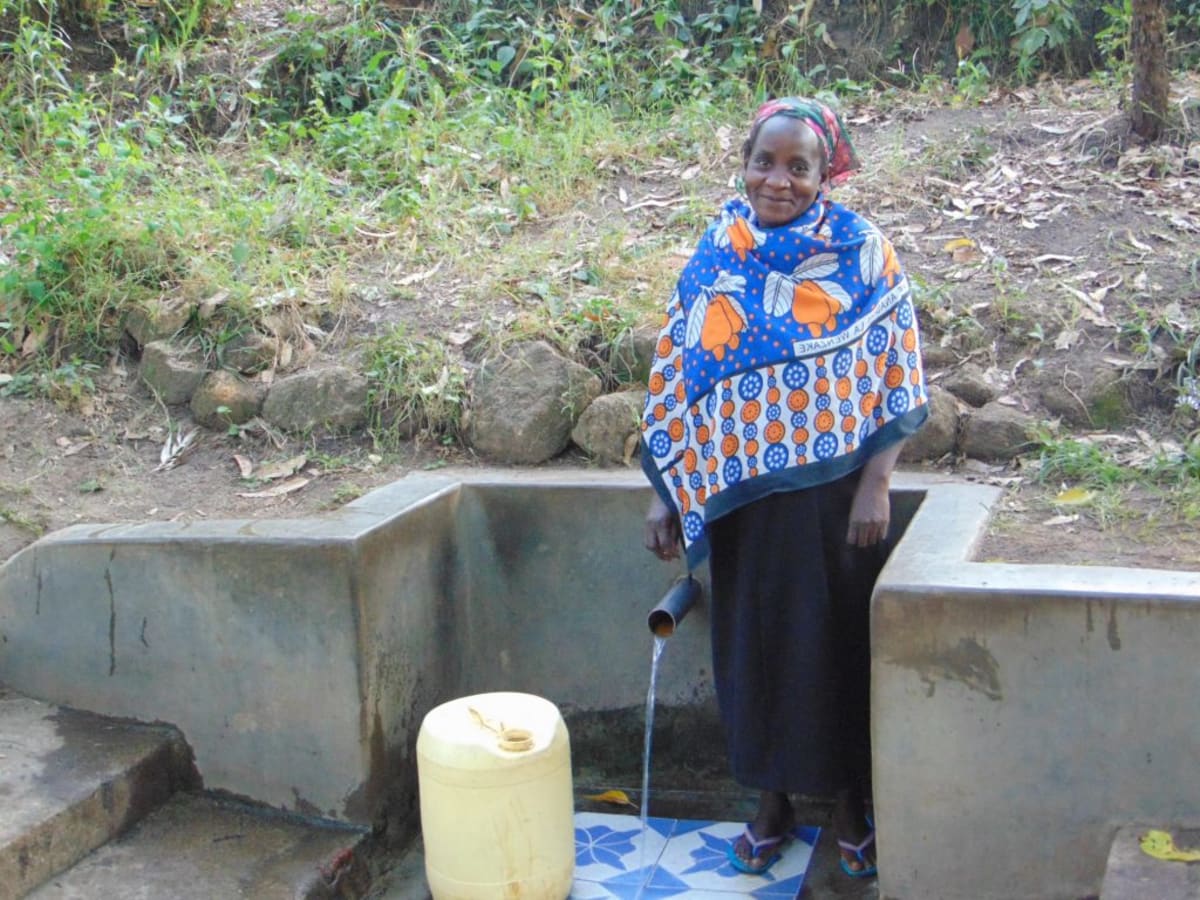A normal day in Shiyunzu starts in the early morning. Children get ready for school and adults get ready to do what they can to make a living. Some community members extract stones that they break up into ballast. Selling these construction materials makes decent money, and some children drop out of school to help their parents.
Women are primarily responsible for finishing house chores like fetching water, cooking and cleaning. After, they join the others who are breaking stones.
This community is unique, for it has brought together people from at least five different tribes.
Water Situation
A point of unity in Shiyunzu is their main water source, Imbukwa Spring. Hundreds rely on this contaminated water source to meet their drinking, cooking, and cleaning needs. The water source is open to any animals that wish to sate their thirst. To draw water, people drunk their containers under the surface. As it rains, even more contaminants are washed into the spring. Nonetheless, there is no other choice.
There are conflicts that arise as people use the spring; one family will blame another when they arrive to fetch water and find leaves and dirt swirling on the surface. There are often several cases of waterborne diseases in the community, especially among the children.
Phylis Bitsengwa said, "We really thank God for bringing you to our community. We are tired of treating our children for diarrhea and stomachaches which we believe are from the dirty water which we get from our spring. If we could have our spring protected, I believe we would not be experiencing all these problems."
Sanitation Situation
Over half of the households around Shiyunzu have a basic pit latrine. However, many of these are in poor condition. The mud walls have holes in them and are not private at all. The floors are made of wood slats that rot away quickly and can't be cleaned. Between these low numbers and poor conditions, open defecation is the practice of most children who find it easier to find the privacy of bushes.
There are no hand-washing stations, though most families have at least a clothesline and dish rack.
What we can do:
Training
Community members will attend hygiene and sanitation training for at least two days. This training will ensure participants have the knowledge they need about healthy practices and their importance. The facilitator plans to use PHAST (Participatory Hygiene and Sanitation Transformation), CLTS (Community-Led Total Sanitation), ABCD (Asset-Based Community Development), group discussions, handouts, and demonstrations at the spring. One of the most important topics we plan to cover is the handling, storage, and treatment of water. Having a clean water source will be extremely helpful, but it is useless if water gets contaminated by the time it’s consumed. Handwashing will also be a big topic.
Training will also result in the formation of a committee that will oversee operations and maintenance at the spring. They will enforce proper behavior around the spring and delegate tasks that will help preserve the site, such as building a fence and digging proper drainage. The fence will keep out destructive animals, and the drainage will keep the area’s mosquito population at a minimum.
Sanitation Platforms
On the final day of training, participants will select five families that should benefit from new latrine floors.
Training will also inform the community and selected families on what they need to contribute to make this project a success. They must mobilize locally available materials, such as bricks, clean sand, hardcore, and ballast. The five families chosen for sanitation platforms must prepare by sinking a pit for the sanitation platforms to be placed over. All community members must work together to make sure that accommodations and food are always provided for the work teams.
Spring Protection
Protecting the spring will ensure that the water is safe, adequate and secure. Construction will keep surface runoff and other contaminants out of the water. With the community’s high involvement in the process, there should be a good sense of responsibility and ownership for the new clean water source.
Fetching water is predominantly a female role, done by both women and young girls. Protecting the spring and offering training and support will, therefore, help empower the female members of the community by giving them more time and efforts to engage and invest in income-generating activities.
A community member told us, "We are much pleased with the work that you did to our school, for our children have told us. (Maganyi Primary School). We thank God so much for you for helping our school and now you have followed us up to our homes to ensure we have clean and safe drinking water. As a community of Shiyunzu, we are ready to provide the locally available materials needed and cooperate to ensure we get clean water. It is also our prayer that God Almighty may protect you always as you continue helping other people just as you have blessed us."

 Protected Spring
Protected Spring
 Rehabilitation Project
Rehabilitation Project




































